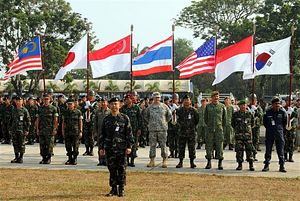Time for this week’s China news:
Two Chinese military drills were in the news this week. First, last week China held naval exercises in the waters between Australia and Indonesia, believed to be the first time China has held military drills so close to Australia. According to ABC, the Chinese Defense Ministry called the drill “normal training,” and Australian Foreign Affairs Minister Julie Bishop pointed out that the exercises took place in international waters. Still, the move has caused some consternation in Australia, with one expert telling the Sydney Morning Herald the drill was “a bit of a wake-up call to our defense planners.” See The Diplomat‘s coverage of the drill here.
Second, China participated for the first time in the U.S.-led multinational “Cobra Gold” military drill, held at Camp Akatosarot in Thailand. China was not a full participant; it had “observer-plus” status and sent only 17 troops to participate in the humanitarian drills. By comparison, the U.S. had about 9,000 troops in the exercise, with 4,000 from Thailand (other participant countries included Japan, South Korea, Singapore, Indonesia, and Malaysia). Chinese experts interviewed by China Daily expect that PLA participation in the drill will grow each year, a sign of the Chinese military’s growing impact on the region.
The joint drill is also seen as a sign that Beijing is open to further military-to-military communication with the U.S. “Whether you are a participant or an observer, whether you have been here from the beginning or this is your nation’s first Cobra Gold, your presence here demonstrates your country’s resolve to support peace and stability in the region,” U.S. Pacific Command chief Admiral Samuel Locklear said at the opening of the exercise.
In other news, Bloomberg Businessweek reports on the problem of Alzheimer’s and dementia in China. As China confronts an aging population, a side effect of the one-child policy, elder care becomes an increasingly pressing need. Businessweek points out that China has nine million Alzheimer’s patients, but there are only 300 doctors in China qualified to treat dementia. One Beijing specialist on Alzheimer’s told the authors that Alzheimer’s has rapidly become a major issue: “In the space of 10 to 15 years, it suddenly went from zero to a big problem. In another 20 to 30 years, it’s going to be a big disaster.”
The Chinese government is well aware of this — last fall, Beijing announced plans to overhaul the elderly care system, both by stepping up public services and by encouraging private investment in nursing homes and other services for seniors. If done right, the push to provide for an aging population could help China’s economy transition to a more service-oriented profile — the government’s elder care system alone is expected to provide 10 million jobs. If not handled right, though, the result will be tragic for families trying to cope with diseases like Alzheimer’s.
Earlier this week, the New York Times reported that a top Chinese regulator had asked JPMorgan Chase CEO Jamie Dimon to do him a “favor” by hiring a family friend. The young woman in question (described as well-qualified) was indeed hired. The Times story sparked a debate about the proper line between taking advantage of personal connections (known as guanxi in Chinese) and bribery. JPMorgan and other banks (including Citigroup, Credit Suisse, UBS, and Morgan Stanley) are already under investigation by the U.S. federal government for allegedly hiring individuals in exchange for preferential treatment from Chinese government officials.
Further underlining the complexity of the issue, Businessweek points out that top U.S. universities routinely accept applicants from wealthy and powerful Chinese families. Harvard, for example, currently counts Xi Jinping’s daughter as one of its undergraduates, and Bo Xilai’s son was studying at the Harvard Kennedy School when Bo went on trial. These same universities also generally run profitable programs within China, such as Harvard Center Shanghai — so, like JPMorgan, Harvard could be benefiting from family ties to government leaders.
Finally, Financial Times reports on China’s decision to move away from its long-standing policy of being self-sufficient in grain production. New guidelines now seek to “stabilize” grain production at 550 million tons in 2020 — the 2013 harvest was just over 600 million tons. To make up the difference, China is expected to increase its imports of grains, which could benefit exporters such as the U.S., Australia, and Canada. Chinese experts have said that the government is focusing its domestic production efforts on food grains such as rice and wheat, suggesting that the decrease in grain production (and increase in grain imports) will mostly affect grains used for feeding livestock, like corn.

































